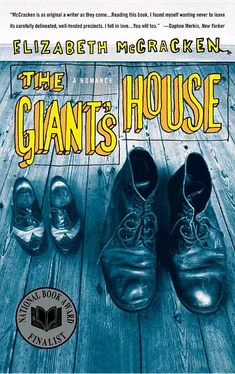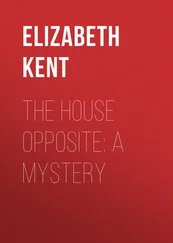I could hear Mrs. Sweatt inside the house waking up, asking in her twangy voice, now unstrung with sleep, what time is it?
Early, said Caroline, which of course means nothing to a sleeper.
Then Caroline started to sing. Perhaps she’d been waiting for Mrs. Sweatt to wake up all afternoon, so she could sing inside her house. I imagined her stepping out on the back porch to sing now and then, like a polite smoker. She had the voice of a dancer, I mean like Fred Astaire or Gene Kelly, someone who has such grace at another art that the grace suffuses their voice, which does not quite match the tune but instead strolls up to a note and stands right next to it, that slight difference so beautiful and heartbreaking that you never want to hear a professional sing again. Professionals remember all the words. Caroline’s song was patched together with something something something .
Everyone Felt Sorry for the Beiderbeckes
I won’t pretend that I was in love with James right away. He was only a boy, though one I liked quite a bit.
Well, now. Only this far into the story and already I’m lying. Juvenile magazines feature close-up photographs of things that are, like love, impossible to divine close up for the first time: a rose petal, a butterfly’s wing, frost. Once you’re told what they are, you can’t believe you didn’t see it instantly. So yes, I loved James straight off, though I didn’t realize it then. I know that sounds terrible, the sort of thing that makes people think I’m crazy or worse.
But there was nothing scandalous about what I felt for James. I am not a scandalous person. No, that isn’t true either. Given half a chance I am scandalous, later facts bear that out. But life afforded me few opportunities in those days. He was not even a teenager and more than half a foot taller than the average American man. I was more than twice his age and I already loved him.
There’s a joke about that. A forty-year-old man (it’s always a man) falls in love with a ten-year-old girl. He’s four times her age. He waits five years; now he’s forty-five and she’s fifteen and he’s only three times her age. Fifteen years later he’s sixty, only double her age.
How long until she catches up completely?
I love that joke. It reads like a chart, like the grids that were eventually printed in medical journals, describing James’s growth, at age ten, age twelve, steady intervals of time and quite nearly as steady in inches. Imagine it: my age on one side of a chart, James’s on the other. How long until he catches up?
James and I met at a particularly happy time in his life. He was just six foot two, remarkably tall but not yet automatically noticed on the street. At school, yes: he was eleven, and this was the year that the tallest kids in the classes were girls, and the boys, innocent of adolescence, occupied the front row of class pictures, the far right-hand side of gym class lineups. James always knew where he belonged in such indexing, but he wasn’t strange. Out in the world he just seemed like a nice, naive, full-grown man.
In 1950, when I met James Carlson Sweatt, I was twenty-five years old, without any experience at love whatsoever. I don’t mean beaux; I’d had those, stupid boys. In college I’d had friends and boyfriends, was invited to parties and asked to the movies. I wasn’t objectionable, not then, but neither was I exceptional: after graduation, I never heard from a single college chum. In library school I had a few after-class-coffee friends, but that was it.
Then I moved to Brewsterville. Suddenly, I felt quite sure I would never hear an affectionate word from another human being in my life. Most days I spoke only to my library patrons, which is one reason I loved my work — it kept me from being one of those odd women discussed in books of odd people: her neighbors saw her only as a shadow on the street; then she died, buried beneath newspapers, movie magazines, and diaries filled with imaginary conversations .
Even with work, I was odd enough. Every morning I walked along the gravel path from my house to the sidewalk, thinking, Is this who I am? A lonely person? I felt awkward as a teenager most days, as if Cape Cod were one big high school that I had enrolled in too late to understand any of the running jokes. My life was better in many ways than it had been in high school, I knew that. I worked harder, which was a blessing; my skin had turned up pleasant enough. I had been kissed.
But I still dreamed of kisses that wouldn’t be delivered, and I knew they wouldn’t be delivered, and I grew morose as I waited to be stood up by nobody in particular. I was aware that I didn’t know anything about love; every morning I realized it again.
And then I met a tall boy.
If I were a different sort of woman, I would point to fate. I would claim that I understood the course of the rest of my life the minute James walked into my library. But if I were a different sort of woman, I wouldn’t have needed to cling to the weekly polite visits of a tall boy, or to wonder what went on in a house with painted flowers on the side, dreaming of the day I might be allowed back in.
That, perhaps, is all you need to know. I was not a different sort of woman . Right there you have my life story, because my life is beside the point. Most lives are. Just as Bartlett’s is not interested in the librarian’s quotations, Who’s Who is not interested in the librarian’s life. In a big library you will find dozens of biographical dictionaries: South American women writers, Scottish scientists of the eighteenth century, military men and psychologists and businesspeople; the important citizens of every country.
You will not find a volume marked Everybody Else .
You will not find me in any reference source; your finger will slide along index after index, under Cort, under Librarians — American, but you won’t find the slightest reference to me.
You might be tempted to ask, but I’ll tell you: it’s a colorless story, one that no one could possibly be interested in. By now it’s outdated and probably riddled with lies. If somebody wrote the story of my life before James (and it would be a short book, repetitious and unillustrated), I would not buy it; I would not have it on my shelf. It would be a waste of the budget.
I was a librarian when I met him. That much is important. I had my library, which I loved and despised. All librarians, deep down, loathe their buildings. Something is always wrong — the counter is too high, the shelves too narrow, the delivery entrance too far from the offices. The hallway echoes. The light from windows bleaches books. In short, libraries are constructed by architects, not librarians. Do not trust an architect: he will always try to talk you into an atrium.
Space is the chief problem. Books are a bad family — there are those you love, and those you are indifferent to; idiots and mad cousins who you would banish except others enjoy their company; wrongheaded but fascinating eccentrics and dreamy geniuses; orphaned grandchildren; and endless brothers-in-law simply taking up space who you wish you could send straight to hell. Except you can’t, for the most part. You must house them and make them comfortable and worry about them when they go on trips and there is never enough room.
My library was no exception. It had started its life in 1880 as a nice one-room building; almost immediately the collection was crowded. The town started to tack on additions: a skinny hall, a dusty reading room, two stories of stacks with frosted glass floors. These floors — an invention of the nineteenth century — were composed of panes cloudy as cataracts which allowed only close-up objects to show through. On the second floor you could see the glow of the lightbulbs that lit the first floor; on the first floor you could see the outline of people’s feet by looking up. The panes of glass were always cracking and had to be replaced with wood. The shelving went right through the floors, and there were gaps where they met the glass panes, which meant that a man on the first floor could look up the skirt of a woman on the second, if he were so inclined, and at least once a month some man was.
Читать дальше












